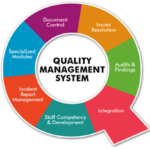System Management
Systems management standards is designed to help organizations ensure that they meet the needs of customers and other stakeholders while meeting statutory and regulatory requirements related to a product or program.
An organization gets benefited if there is an effective quality management system. The concept of a quality organization is the system in which customer and supplier working together for their mutual benefit. To become effective system for managing all interested parties in a way which can create well results and can achieve set targets.
Scope: any organization or a company registered with local government authority having physical evidence.

Every organization whether it is big, medium and small it had some responsibilities towards environment, Environmental management system fix up that responsibility to give to the environment as much as an organization can in their limited resources; refers to the management of an organization’s environmental programs in a comprehensive, systematic, planned and documented manner. It includes the organizational structure, planning and resources for developing, implementing and maintaining policy for environmental protection.
Food safety management system where an organization in the food chain needs to demonstrate its ability to control food safety hazards in order to ensure that food is safe at the time of human consumption. It is applicable to all organizations, regardless of size, which are involved in any aspect of the food chain and want to implement systems that consistently provide safe products.
In organizations where human risk is highly involved; it is really very important to have such standard which can review all the systems for human safety involved in occupation with a concerned organization. OHSAS 18001 is an Occupation Health and Safety Assessment Series for health and safety management systems. It is intended to help organizations to control occupational health and safety risks. It was developed in response to widespread demand for a recognized standard against which to be certified and assessed.
Business continuity management is a framework for identifying an organization’s risk of exposure to internal and external threats. The goal of BCM is to provide the organization with the ability to effectively respond to threats such as natural disasters or data breaches and protect the business interests of the organization. BCM includes disaster recovery, business recovery, crisis management, incident management, emergency management and contingency planning.
A Goods manufacturing practices is a system for ensuring that products are consistently produced and controlled according to quality standards. GMP covers all aspects of production from the starting materials, premises and equipment to the training and personal hygiene of staff. Detailed, written procedures are essential for each process that could affect the quality of the finished product. There must be systems to provide documented proof that correct procedures are consistently followed at each step in the manufacturing process – every time a product is made.
ISO 13485 was written to support medical device manufacturers in designing quality management systems that establish and maintain the effectiveness of their processes. It ensures the consistent design, development, production, installation, and delivery of medical devices that are safe for their intended purpose.
The ISO/TS16949 is an ISO technical specification aimed at the development of a quality management system that provides for continual improvement, emphasizing defect prevention and the reduction of variation and waste in the automotive industry supply chain.










